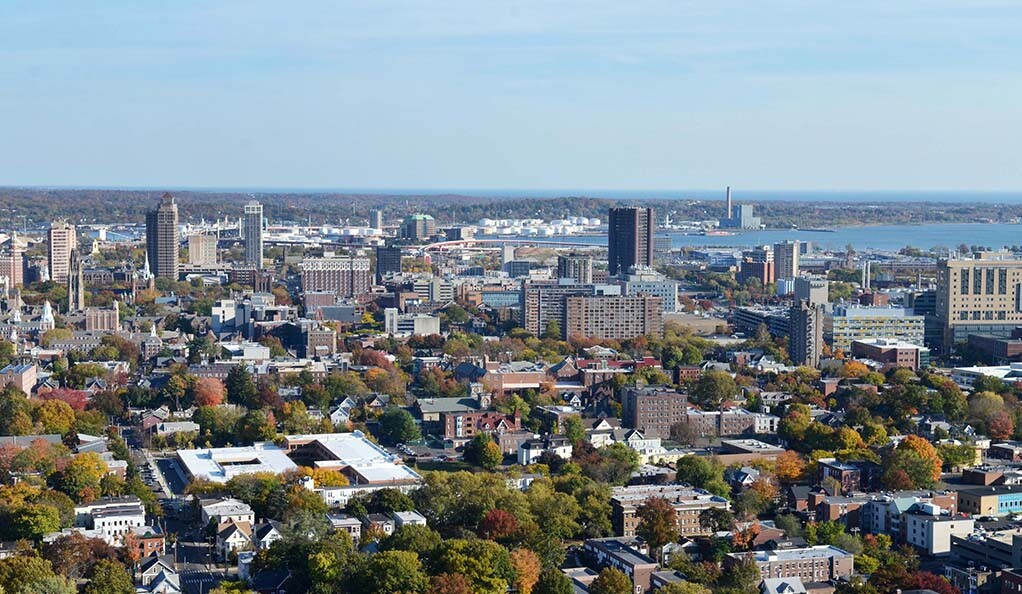Elicker says more than 64 percent of eligible residents fully vaccinated
The city has partnered with several community outreach organizations to promote education about the vaccine and provide access to all residents of New Haven. The vaccination rates are increasing, but there are still many hesitant residents.

Yale News
Eighteen months after the pandemic first reached New Haven, the city is finally seeing a decline in COVID-19-related hospitalizations and positive COVID-19 tests, primarily due to its high vaccination rates. However, the city’s vaccination efforts are not over yet.
On Tuesday, public health officials and Mayor Justin Elicker held a press conference outside City Hall to provide an update about New Haven’s vaccination efforts and COVID-19 rates. According to Elicker, more than 71 percent of the city’s eligible residents — residents above the age of 12 — have received at least one vaccination shot, with 64.7 percent fully vaccinated. Elicker said that New Haven’s partnerships with health- and community-oriented organizations were essential in achieving these numbers, and there are now over 530 pop-up vaccination sites around the city.
“It starts with community, and it ends with community,” said Maritza Bond, New Haven’s director of health.
Last month, the city announced that all New Haven city employees would be required to get vaccinated or undergo weekly COVID-19 testing. Now, over 70 percent of the city’s government workers are vaccinated, and 90 percent of the city’s government employees are registered under the program to either be vaccinated or comply with testing. According to Elicker, the city has been flexible so far with the remaining 10 percent of employees, but after the Sept. 27 deadline, people who decline to comply with the mandate could be deemed unfit for work.
Crystal Emery — the CEO and founder of URU, The Right to Be, Inc., a nonprofit focused on community outreach and diversity — said that the city’s partnership with smaller local organizations is “important because you have to reach people where they are.” Elicker and Bond also both acknowledged that the city government alone could not have achieved the Elm City’s current vaccination numbers without the help of their community partners.
Wilbur Cross High School student athletes Jarel Delgado and Christian McClease, alongside Erik Patchkofsky, the director of athletics for New Haven Public Schools, are helping in the fight against COVID-19. They have been hosting vaccine clinics at high school athletics events and tryouts, as well as launching ad campaigns to target the city’s youth. According to McClease, the reason so many of his peers remain unvaccinated is due to misinformation.
“Other students are just afraid. They don’t want COVID in their body,” McClease said, referring to a misconception that the vaccine contains the live virus.
In order to reach members of the community affected by misinformation, organizations such as the Cornell Scott-Hill Health Center and the Community Action Agency of New Haven have been working to educate the public about the safety and efficacy of COVID-19 vaccines. Of the 46,000 vaccine doses the center has administered, over 20,000 of them have been at pop-up locations in partnership with various businesses and nonprofits around the city.
The Community Action Agency of New Haven — an organization aimed at bringing people out of poverty — has also instituted a call center where volunteers call residents of the city and answer their questions about the COVID-19 vaccination. Amos Smith, the CEO and president, also mentioned the need to target young people the most.
“We are in the middle of one of the worst public health crises in our lifetime,” Smith said on Tuesday.
The Community Alliance for Research and Engagement, an organization focused on health equity among New Haven residents, has also been working to combat vaccine-related misinformation. Prior to the pandemic, the group worked to increase confidence in the flu vaccine. Now, they have added the COVID-19 vaccine to their messaging. As they are not vaccine providers, they work closely with the Cornell Scott-Hill Health Center, Fair Haven Community Health Care and other health organizations to administer vaccinations.
Recently, the city opened a new COVID-19 testing site funded by the Department of Public Health on 60 Sargent Drive, open six days a week.







